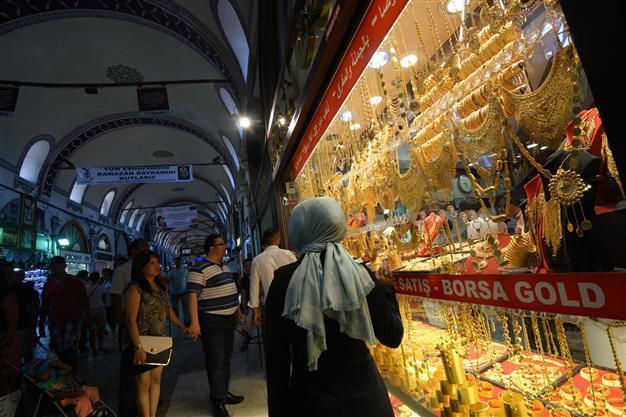Turkey’s current account deficit narrows on gold trade
ISTANBUL

Turkey registered a record amount of gold exports to Switzerland in March, according to the TÜİK data, helping to make the country become a net gold exporter. DAILY NEWS Photo
Turkey’s current account deficit has contracted by 43 percent annually to $3.19 billion in March thanks to a shrinking foreign trade deficit due to sliding gold imports.According to figures released by the Central Bank on May 13, the current account deficit fell by $5.09 billion compared to the same month last year, in line with market expectations that were around $3.2 billion.
The bright March figures also drove the first quarter deficit to 31 percent lower than the same period last year of $11.46 billion.
“This decrease is mainly accounted for by the foreign trade deficit in the balance of payments table, which has decreased $5.228 billion over the first quarter of 2013, recording $11.987 billion, as well as the services account, which had a surplus of $2.676 billion, increasing by $229 million,” the Central Bank said in a statement accompanying the figures.
Turkey’s current account deficit, the Achilles’ heel of the country’s economy, was $5.65 in March of last year and $16.55 billion in the first quarter of 2013.
The government estimates that the current account deficit to retreat to $55.5 billion in 2014, hoping its ratio to GDP will be 6.4 percent.
The first quarter performance fueled the government’s hopes of achieving progress to cure the country’s greatest vulnerability by the year-end, as macro-prudential measures taken by the banking watchdog to limit domestic spending, as well as the strong export environment, helped the deficit shrink beyond forecasts.
Turkey ran a trade deficit of $5.2 billion in March, 30.1 percent lower than the same month last year, with the support of the balancing gold trade, data from the Turkish Statistical Institute (TÜİK) showed on April 30.
The balance of payment figures announced by the Central Bank also shows that Turkey turned into a net gold exporter in the first quarter as its gold-for-gas trade with Iran, which necessitated importing large amounts of gold to transfer to its gas-rich neighbor, came to a halt.
“Non-monetary gold items recorded a net export of $1.647 billion in the first quarter, in contrast to the net import of $1.311 billion recorded in the same period of 2013,” the data showed.
Trade with Iran boomed in 2012 when Ankara was paying for its natural gas and oil imports with the Turkish Lira, and Iranians were using those deposits held in Turkish bank accounts to buy gold.
However, the trade tailed off last year when U.S. sanctions on Tehran tightened, leading to the remarkable closure of the deficit in Turkey’s trade balance.
In addition to a slowdown in gold imports, Turkey registered a record amount of gold exports to Switzerland in March, according to the TÜİK data, helping to make the country become a net gold exporter.
Analysts also explain the soar in Swiss gold trade in relation to Iranian gas ties, arguing that Turkey might have sold to Switzerland some of its gold stocks that had been piled for Iran, to be turned into cash in order to benefit from declining gold prices.
Meanwhile, the figures of non-residents’ net direct investment in Turkey, which recorded $1.43 million in March, soared by $1.39 billion to 4.18 billion in the first quarte of 2014. Turkish residents’ net direct investment abroad recorded also posted a rise of $355 million, reaching $1.04 billion over the first three months of the year.
Forex volatility increases balance of payment errors
ISTANBUL
Net errors and omissions in Turkey’s balance of payments recorded an eye-catching rise in the first quarter, which economists say indicate fluctuations in the currency rate.
Net errors and omissions, which are used to reflect residuals to ensure that accounts in the balance of payments statement amount to zero, reached $2.44 billion in March, the highest level since September 2013.
The net errors and omissions in the first three months of 2014 exceeded $6.6 billion in total. Over the last nine months the figure is $11.4 billion.
Burgan Investment Chief Economist Haluk Bürümekçi said the upsurge of the item was normal during volatile currency rate periods.
“The changes in foreign exchange accounts when the currency rate is too volatile are written under the ‘net errors’ item, as it can’t be written anywhere else,” he said.
Meanwhile, economist Uğur Gürses suggested that the rise might stem from Turkish entrepreneurs using their foreign assets to pay for imports.
He said foreign deposits were particularly used when the financial markets are turbulent.
















